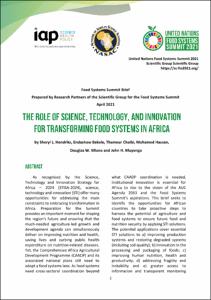The Role of Science, Technology, and Innovation for Transforming Food Systems in AfricaFood Systems Summit Brief Prepared by Research Partners of the Scientific Group for the Food Systems Summit April 2021

The Role of Science, Technology, and Innovation for Transforming Food Systems in Africa
Food Systems Summit Brief Prepared by Research Partners of the Scientific Group for the Food Systems Summit April 2021

| dc.contributor.author | Hendriks, Sheryl L. | |
| dc.contributor.author | Bekele, Endashaw | |
| dc.contributor.author | Chaibi, Thameur | |
| dc.contributor.author | Hassan, Mohamed | |
| dc.contributor.author | Miano, Douglas W. | |
| dc.contributor.author | Muyonga, John H. | |
| dc.date.accessioned | 2021-06-13T21:03:38Z | |
| dc.date.available | 2021-06-13T21:03:38Z | |
| dc.date.issued | 04.2021 | |
| dc.identifier.uri | https://hdl.handle.net/20.500.11811/9149 | |
| dc.description.abstract | As recognised by the Science, Technology and Innovation Strategy for Africa – 2024 (STISA-2024), science, technology and innovation (STI) offer many opportunities for addressing the main constraints to embracing transformation in Africa. Preparation for the Summit provides an important moment for shaping the region's future and ensuring that the much-needed agriculture-led growth and development agenda can simultaneously deliver on improving nutrition and health, saving lives and curbing public health expenditure on nutrition-related diseases. Yet, the Comprehensive Africa Agricultural Development Programme (CAADP) and its associated national plans still need to adopt a food systems lens. As food systems need cross-sectoral coordination beyond what CAADP coordination is needed, institutional innovation is essential for Africa to rise to the vision of the AUC Agenda 2063 and the Food Systems Summit's aspirations. This brief seeks to identify the opportunities for African countries to take proactive steps to harness the potential of agriculture and food systems to ensure future food and nutrition security by applying STI solutions. The potential application (including soil quality); b) innovation in the processing and packaging of foods; c) improving human nutrition, health and productivity; d) addressing fragility and instability and e) greater access to information and transparent monitoring and accountability systems. Change will need to be supported by institutional coordination; clear, food safety and health- conscious regulatory environments; greater access to information and transparent monitoring and accountability systems. Mechanisation and digitisation will speed up such transformation and enable more inclusive advancement of food systems. ICT solutions and advances could play a significant role in advancing food systems and addressing inequalities in access to inputs, knowledge and markets. Adaptation through sustainable intensification and agricultural diversification may have to be combined with the creation of off-farm opportunities, both locally and through strengthened rural-urban linkages. Financial support (microfinance, credit, subsidies, loans, insurance, etc.) plays an important role in risk reduction for producers. | en |
| dc.format.extent | 22 | |
| dc.language.iso | eng | |
| dc.rights | In Copyright | |
| dc.rights.uri | http://rightsstatements.org/vocab/InC/1.0/ | |
| dc.subject | Food systems | |
| dc.subject | Ecosystems | |
| dc.subject | Technology and innovations | |
| dc.subject | Africa | |
| dc.subject.ddc | 333.7 Natürliche Ressourcen, Energie und Umwelt | |
| dc.title | The Role of Science, Technology, and Innovation for Transforming Food Systems in Africa | |
| dc.title.alternative | Food Systems Summit Brief Prepared by Research Partners of the Scientific Group for the Food Systems Summit April 2021 | |
| dc.type | Wissenschaftlicher Artikel | |
| dc.identifier.doi | https://doi.org/10.48565/scfss2021-a948 | |
| dc.publisher.name | Center for Development Research (ZEF) in cooperation with the Scientific Group for the UN Food System Summit 2021 | |
| dc.publisher.location | Bonn | |
| dc.rights.accessRights | openAccess | |
| dc.relation.url | https://sc-fss2021.org/wp-content/uploads/2021/06/FSS_Brief_IAP_Africa.pdf | |
| ulbbn.pubtype | Zweitveröffentlichung | |
| dc.version | updatedVersion |
Files in this item
This item appears in the following Collection(s)
-
FSS Briefs by Partners of Scientific Group (41)
"Food Systems Summit Briefs" are invited papers by the Scientific Group in support of the Summit agenda setting.




